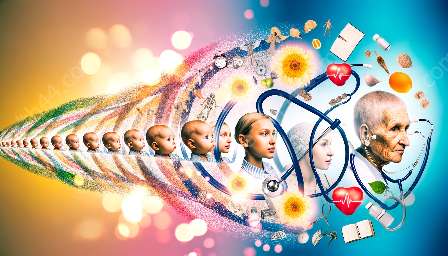Middle childhood, spanning from around 6 to 12 years of age, is a critical period in a child's lifespan development. This stage is characterized by significant physical, cognitive, and psychosocial changes, which have lasting implications for health education and medical training.
Physical Development
During middle childhood, children experience steady physical growth and development. They typically show improvements in motor skills, coordination, and muscle strength. The significance of this period in physical development lies in the establishment of healthy habits and behaviors that can impact long-term health outcomes. Health education programs and medical training must address the specific needs of children in this age group, promoting physical activity, proper nutrition, and regular medical check-ups.
Cognitive Development
Middle childhood is also a time of significant cognitive development. Children's thinking becomes more organized and logical, and they show increased proficiency in problem-solving and decision-making. This developmental stage provides a crucial foundation for future academic achievements and intellectual well-being. Health education should focus on nurturing cognitive skills and critical thinking, while medical training professionals need to be aware of the cognitive milestones typical for this age group.
Psychosocial Development
The psychosocial development of children in middle childhood is characterized by the development of self-identity, social relationships, and emotional regulation. This stage is crucial for the formation of self-esteem, empathy, and a sense of belonging. Health education plays a critical role in fostering positive psychosocial development, teaching children skills for building healthy relationships and managing their emotions. Medical training should also address the emotional and social needs of children by equipping healthcare professionals with strategies to support their psychosocial well-being.
Significance in Lifespan Development
The significance of middle childhood in lifespan development cannot be overstated. The experiences and influences during this period can have a lasting impact on a person's overall health and well-being throughout their life. Understanding the specific needs and challenges of middle childhood is essential for professionals in health education and medical training to provide effective support and interventions that promote lifelong health.
Supporting Children's Well-Being
Supporting children's well-being during middle childhood requires a holistic approach that addresses their physical, cognitive, and psychosocial needs. Health education programs should incorporate age-appropriate curriculum and resources that empower children to make healthy choices and develop positive habits. Medical training needs to emphasize the unique aspects of providing care to children in this age group, ensuring that healthcare providers are equipped to recognize and address the specific health concerns and developmental needs of middle childhood.
The Role of Parents and Caregivers
Parents and caregivers play a central role in supporting children's development during middle childhood. They can create a nurturing environment that fosters healthy habits, encourages cognitive stimulation, and provides emotional support. Health education efforts should not only target children but also engage parents and caregivers in promoting a supportive and enriching environment for children's growth and development. Likewise, medical training should include education for parents and caregivers, empowering them to actively participate in their children's healthcare and well-being.
Conclusion
Middle childhood represents a pivotal stage in lifespan development, with profound implications for health education and medical training. Understanding the unique needs and challenges of this developmental period is crucial for promoting the well-being and growth of children. By recognizing the significance of middle childhood and implementing targeted interventions, professionals can contribute to the long-term health and success of individuals as they progress through the lifespan.


